Table of Contents
With days getting warmer and longer, many people head out into the nature to enjoy starry nights and crisp mornings. However, camping doesn’t come without its challenges and it certainly takes a lot of planning before you go. Wondering what all should be on your camping checklist?
If you want to be completely prepared for any kind of situation, read this handy guide on how to prepare for camping.
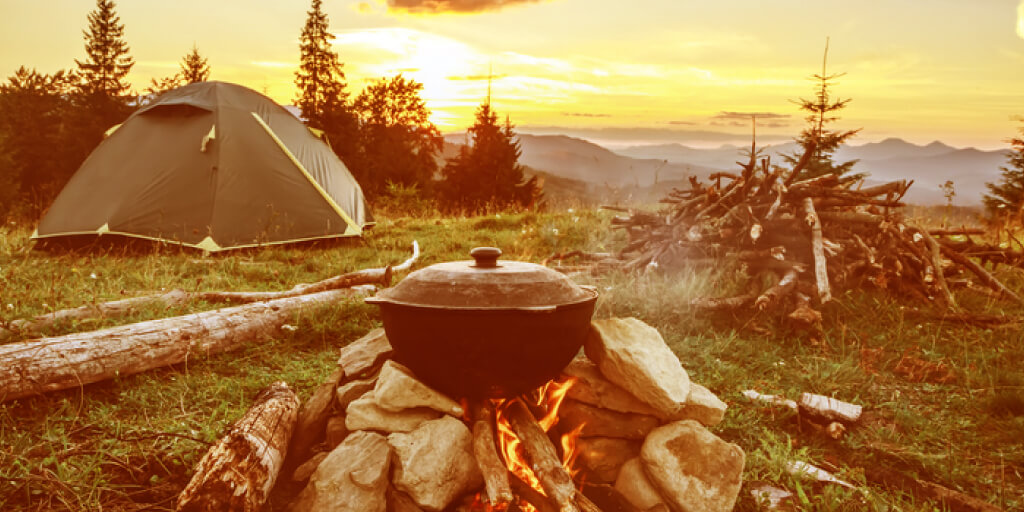
How Do You Prepare for Your Camping Trip?
Spending time in nature can make you more vulnerable to the elements. This means that before you go camping, you need to prepare fully to have a safe and fun experience. Most of it is focused on what you need to survive: water, food, shelter and protection.
So, here are some quick instructions on how to prepare for camping:
Get proper equipment for carrying your things – Buy durable bags, backpacks and other carriers.
Buy or have all of the essentials like tarts, tents, sleeping bags, first aid kits, clothes, flashlights and so on.
Group items – If you have items that you will use all at once or for one thing, group them and make them easy to access. For instance, group all toiletries.
Waterproof electronics with ziplock bags.
Put emergency items in outside pockets.
Pack in order of relevance.
Understand the nature of the area you’ll be camping in – weather, animal and plant life, potential dangers and so on.
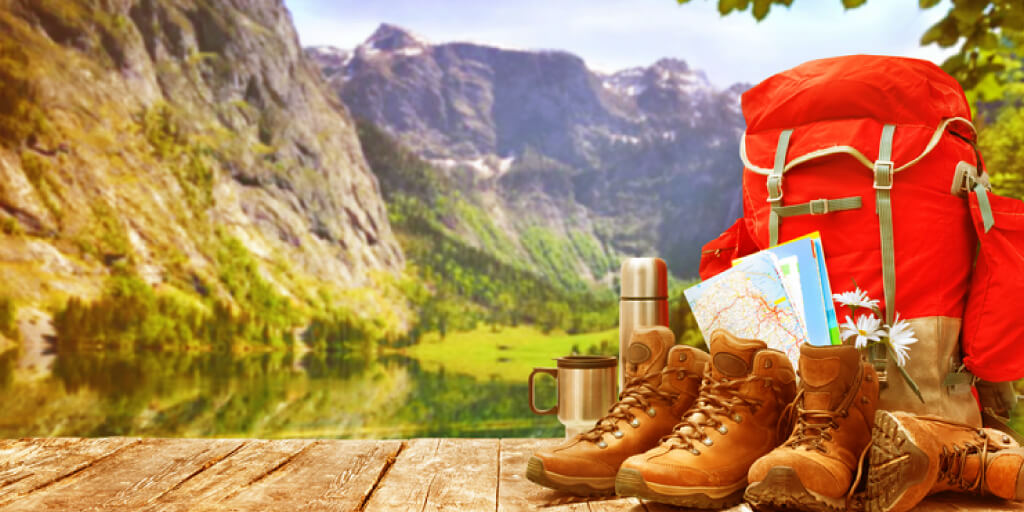
Camping Checklist – The Absolute Essentials
Camping is truly amazing – a perfect way to rest from the big city life and all of that bustle. You can have a peaceful camping trip or enjoy adventures, or do both. But, it can also be quite fickle and tricky. And you also need a lot of things if you want to make your experience memorable.
So, here is the ultimate camping checklist:
Camping Equipment
There are some parts of your camping equipment that are essential and some that are optional.
Essential:
Lightweight backpack and a rain cover to protect it even better.
A day bag or fanny pack for hikes which can easily carry snacks, water and first aid kit.
A tent that’s sturdy, waterproof and good with all weather conditions. The size will match your needs in terms of space, depending on the number of people that come with you.
Tent equipment like repair kits, tent poles, different tools, stakes and so on. Bring a saw too, for cutting wood. (Keep in mind that the amount of equipment and the type of tent will also depend on how long you want to stay – shorter stays require less equipment and lighter tents)
Sleeping bags that are also weather appropriate and warm enough. If kids are coming with you, bring kids sleeping bags.
Sleeping pads and/or air mattresses with high quality that will provide you restful sleep. Take a foam pad as well, if you are taking sleeping pads because it will keep you warm and comfortable.
A pillow is also essential for proper sleep. Of course, since carrying your own from home is not practical, get a collapsible camp pillow or an inflatable one.
Campfire starter and a matchbox or a lighter, as well as a fire starter
You’ll also need lights – headlamps, flashlights, lanterns, mantles, portable solar power equipment, lighting for your kids.
Camp chairs, including kids camp chairs and a camping table.
Navigation essentials like maps, compass, a GPS device. An altimeter would also be useful, especially if you’re bringing your kids. Another essential is a Personal locator beacon or a satellite messenger in case of emergencies.
Optional:
Sunshield or a screen house
A hammock and a kids hammock if you are bringing your kids
Sleeping cot and kids bunk bed sleeping cot
Sleeping bag liners
Rain shield
Firewood
Camp rug or something to cover the ground
Tablecloth with clips or tapes that can make you even more comfortable
Clothesline and clips
Repair kits for your clothes, pillows, pads or mattresses
Brooms and dustpans
Bags, bins and sacks to pack things in them
Duct tape and things for repairing your tent
These are all of the essential and optional items in terms of equipment. Next, we move on to the camp kitchen.
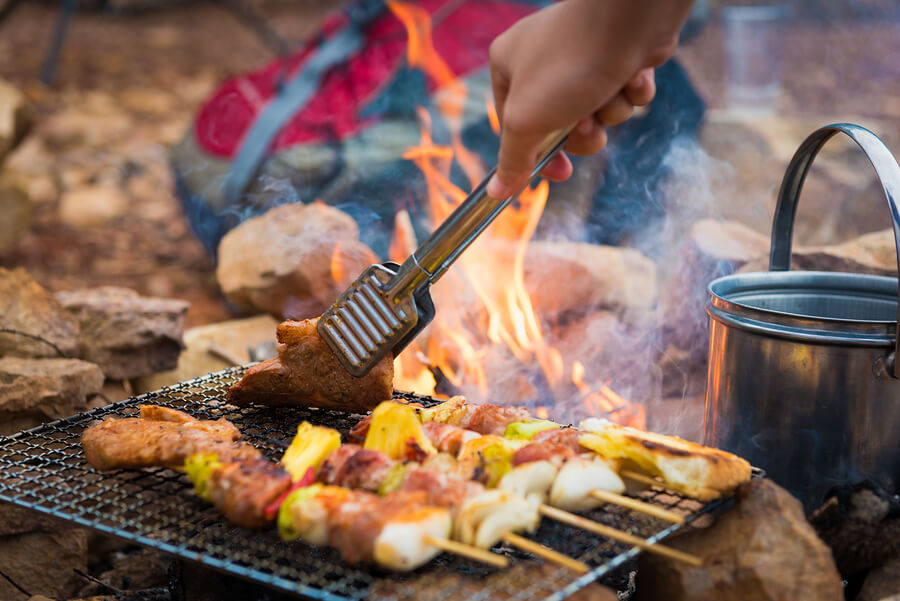
Camp Kitchen
Camping also means enjoying tasty food, made the old-fashioned way. Here are some items you will need for that:
Essential:
Gas stove and fuel
Matches, lighters, fire starters
Cookery like kettles, pans, potholders, pots, cups and so on; try to shop for items that are multi-use.
Roasting sticks – alternatively, you can get aluminum foil and cook over the campfire
Tupperware of ziplock plastic bags – There are leftovers all the time and you want to make sure that you are safe in terms of food
Cooking grate if your campsite doesn’t provide one
Frying pan, griddle or a skillet
Utensils such as spoons, forks, knives, bottle and can openers you may need – a multi-tool can be useful too
Plates and bowls as well as collapsible measuring cups, cutting boards, mugs and cups
Camp sink or wash tub
Natural, environment friendly washing liquid and sponges, dish towels or paper towels
Windscreen if you want to cook over fire
Canister for food storage
Recycling bags
Extra water and drinks according to what you need. Depending on your activities, you might need more water than usual. You can also get a water canteen
Food, obviously. Pack all of the ingredients you may need as well as snacks to keep you energized between the meals
All of this will depend on how long you are planning to stay. For example, you will need less food and water if you don’t plan on staying that long. You can also do with less cooking equipment in that case. But it’s a good idea to go through this list and bring any items that you think will be useful to you.
Optional:
Camp grill or a grill rack
Griddle
Dutch oven
Charcoal grill with charcoal
Portable coffee or tea maker
Marshmallow or hot dog roasting forks
Big water jugs and clear plastic bins
A cooler with ice for perishable foods
Axe or a saw for wood
Cooking stove
This list aims to tell you about all of the things you can bring. Of course, you may not need most of them but your camping experience will be more comfortable with them.
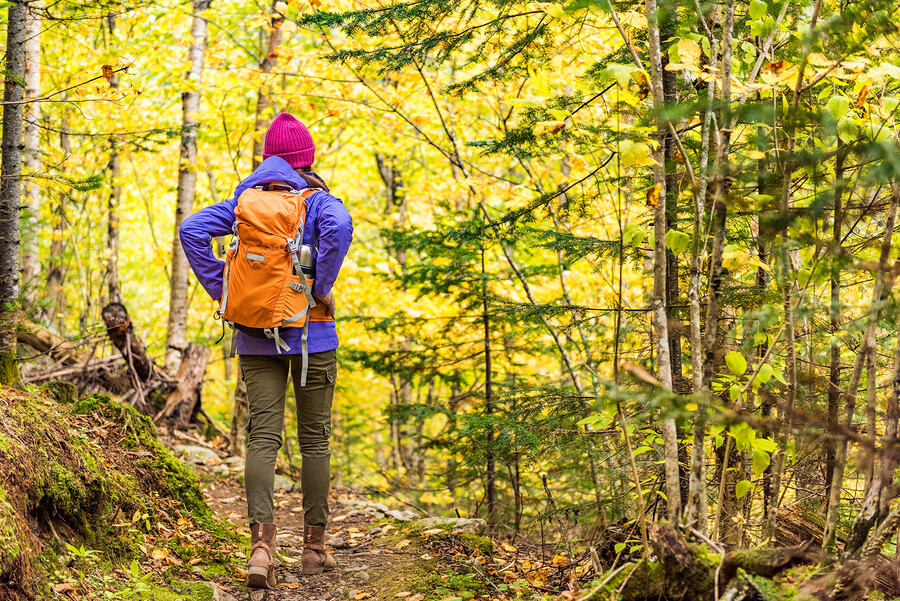
Camping Clothes
One of the most important parts of camping and preparation for camping is bringing the right clothes. While it will largely depend on your campsite and climate, as well as your activities, here are some essentials and optional items that you should check off on your camping checklist.
Essential:
Moisture-wicking underwear, t-shirts and long-sleeve shirts
Hiking boots or shoes
Zip-off or comfy pants
Sun hat or cap
Pajamas
Pants and shorts that can dry quickly
Plenty of socks
Towels and microfiber cloths
Thermal underwear, shirts and pants for winter camping. In this case, you would also bring pants and jackets that are suitable for that weather. You can also bring waterproof gloves and mittens, rain jackets, pants, fleece pants and other rain clothes. Long underwear is also a good idea for winter camping as well as waterproof thermal blankets.
Base your clothes on the weather and the environment you are going to be in. For example, in warm climates, during summer, you will not need thermal clothes or rain clothes. But in colder climates or when it’s not summer, you most likely will.
Make sure to wear in all clothing before taking with you! You do not want to be breaking in new boots or shoes on the trail. Bringing a new pair of pants? Wear them around the house for a day, see how comfortable they are.
Optional:
Swimsuits
Water sandals
In-camp sandals or boots to keep you comfortable
Bandanas
Gaiters for snowy or rainy conditions
Of course, you can bring any other items you might need, but these are some of your best options for camping.
Other gear
This gear will depend on what you personally need and want. Some of the essentials are:
Personal documents and things for communication
Camera
Hygiene camping list; cut down on items by bringing things that are multi purpose, such as all-in-one products. Be sure to include items like:
- Toothpaste
- Toothbrush
- Toilet paper
- Wipes
- Soap
- Shampoo
- Conditioner
- Comb/brush
First aid camping gear – adhesive tape, OTC pain meds, gloves, blister treatment, bandages, gauze, wound coverings, antibacterial wipes and medication, sterile pads, safety pins, tweezers for splinters.
Sun and bug protection – sunglasses, sunscreen, clothing for sun protection
Other personal items – baby wipes, antiseptic wipes, mirrors, portable shower, music player and earplugs, insect repellent, spare glasses, deodorant, lip balm, diapers and other baby gear if needed.
Kid gear for exploring – magnifying glasses, binoculars, walkie talkies, games and toys
Camping gear like:
- Field guides
- Books
- Plant books with pictures; you don't want to run into poison ivy!
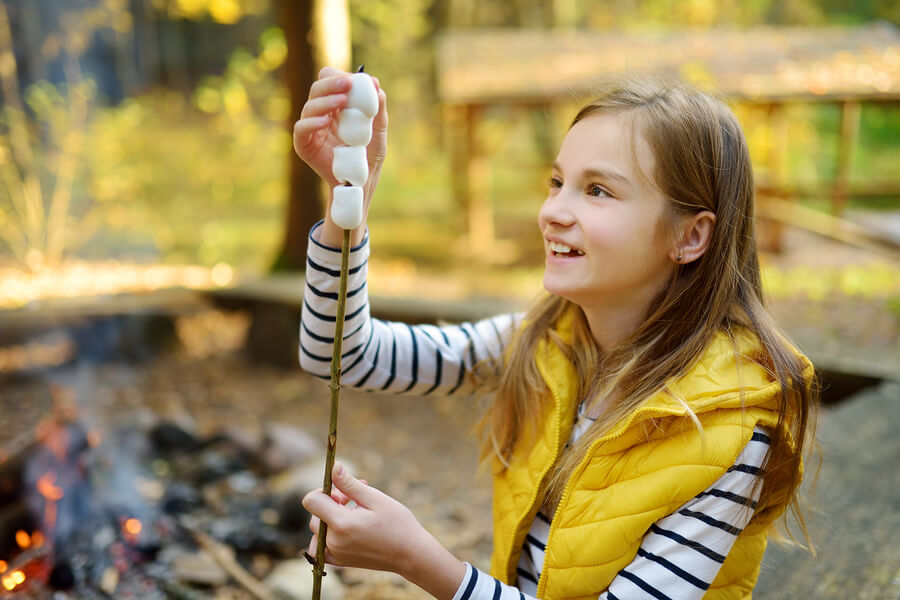
10 Best Foods to Include on Your Camping Checklist
No camping trip can go without food. So, here are some of your best options for easy to make food when camping:
- Dehydrated foods
- Trail mix, bars, nuts and similar
- Instant mac and cheese, cup noodles
- Chili
- Beef jerky and dried fruits
- Instant coffee packets, tea bags
- Stuff for making sandwiches
- S’mores ingredients
- Frozen fruit
- Bagels
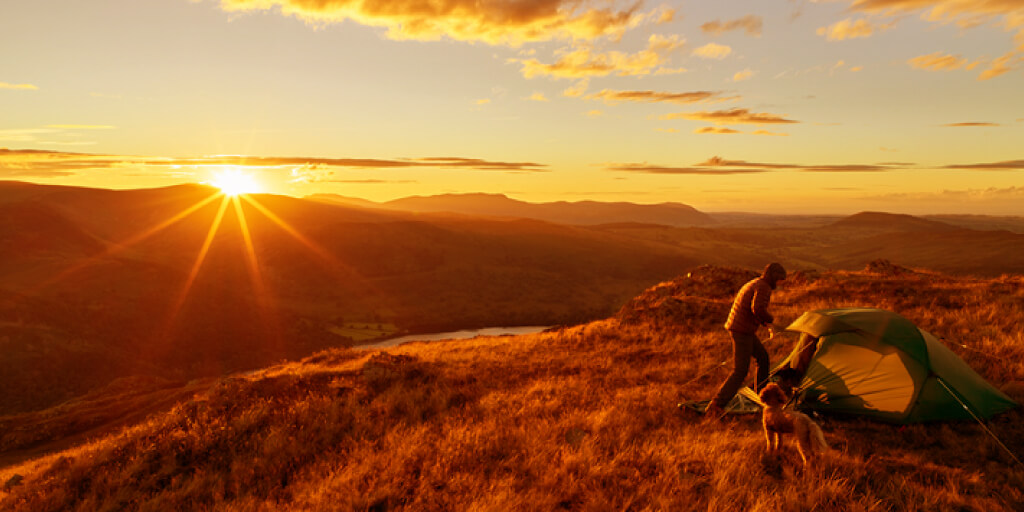
How Do You Camp Safely?
When you camp, aside from having fun, it’s very important to stay safe. Here are some tips:
If caught in a storm, stay away from tall trees – you should also not be in your tent as it can be very dangerous, it’s best to stay in your car
Be aware of the animals in your surroundings and be on the lookout for them. Make sure you do the same when hiking too – check what insects and animals live in that area and prepare accordingly
Always have a first aid kit on you, even when hiking or exploring
Bring maps, GPS, compass and other orientation methods
Tell people about your route and carry a PLB
Drink plenty of water and eat properly
Beware of heights – make sure that your altitude is always something you can handle
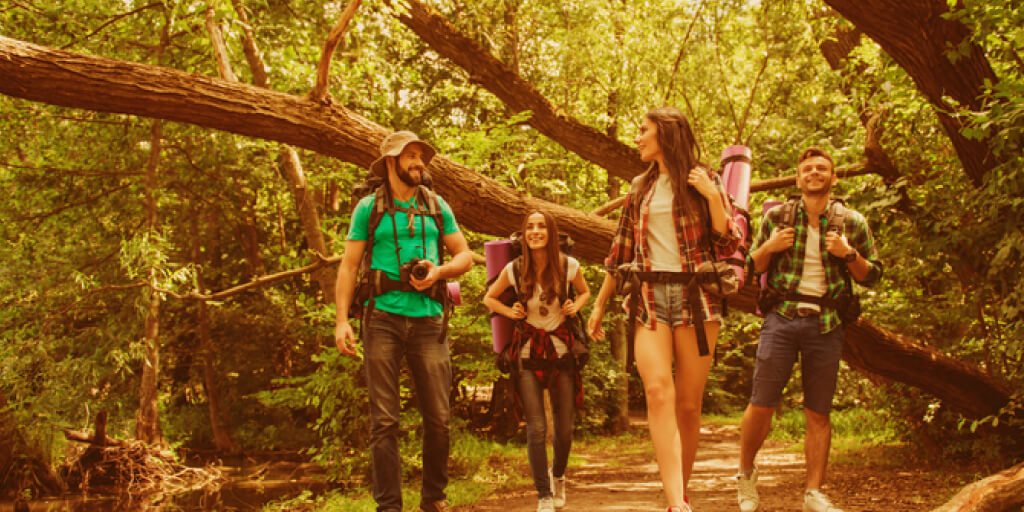
What Not to Wear While Camping
While there are some really camp-appropriate clothes, there are also some that are not so appropriate. Here is a list of things that you should definitely not wear:
Socks with sandals; your feet either need to breathe or be warm & cozy. Pick one!
Swimwear that's poorly fitting; you don't want rashes to ruin your fun!
Wearing too much or too little clothing for that area or climate; heat stroke and hypothermia can both be deadly, especially if you're camping alone or far away from help.
Flip flops or other non-supportive shoe.
So that's our ultimate camping checklist! What's your must-have item when out camping? le
Sources:
https://mashable.com/2015/06/12/camping-safety-tips/
https://spoonuniversity.com/lifestyle/10-best-foods-to-bring-camping

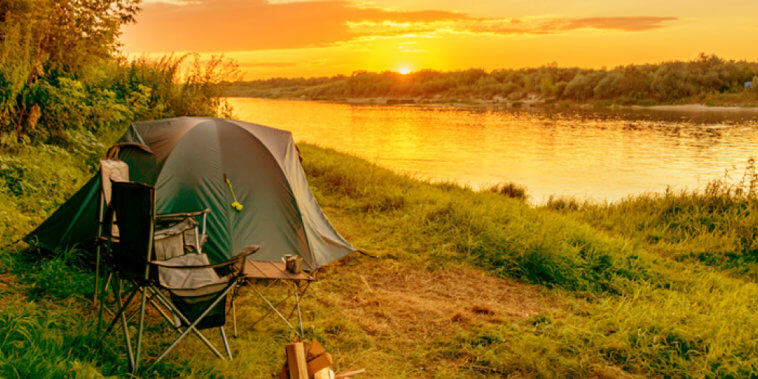
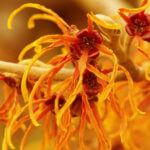
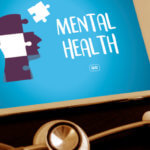
Comments
Loading…